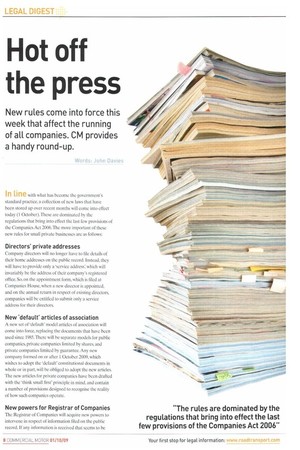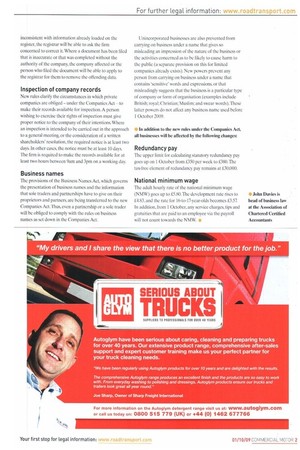Hot off the press
Page 28

Page 29

If you've noticed an error in this article please click here to report it so we can fix it.
New rules come into force this week that affect the running of all companies. CM provides a handy round-up.
Words: John Davies In Lin,. with what has become the government's standard practice, a collection of new laws that have been stored up over recent months will come into effect today (1 October). These are dominated by the regulations that bring into effect the last few provisions of the Companies Act 20045.The more important of these new rules for small private businesses are as follows:
Directors private addresses
Company directors will no longer have to file details of their home addresses on the public record. Instead, they will have to provide only a 'service address', which will invariably be the address of their company's registered office. So, on the appointment form, which is filed at Companies House, when a new director is appointed, and on the annual return in respect of existing directors, companies will be entitled to submit only a service address for their directors.
New 'default' articles of association
A new set of 'default' model articles of association will come into force, replacing the documents that have been used since 1985. There will he separate models for public companies, private companies limited by shares, and private companies limited by guarantee. Ally new company formed on or after 1 October 2009, which wishes to adopt the 'default' constitutional documents in whole or in part, will be obliged to adopt the new articles. The new articles for private companies have been drafted with the 'think small first' principle in mind, and contain a number of provisions designed to recognise the reality of how such companies operate.
New powers for Registrar of Companies
The Registrar of Companies will acquire new powers to intervene in respect of information filed on the public record. If any information is received that seems to be inconsistent with information already loaded on the register, the registrar will be able to ask the firm concerned to correct it. Where a document has been filed that is inaccurate or that was completed without the authority of the company, the company affected or the person who filed the document will be able to apply to the registrar for them to remove the offending data.
Inspection of company records New rules clarify the circumstances in which private companies are obliged — under the Companies Act — to make their records available for inspection. A person wishing to exercise their rights of inspection must give proper notice to the company of their intentions. Where an inspection is intended to be carried out in the approach to a general meeting, or the consideration of a written shareholders' resolution, the required notice is at least two days. In other cases, the notice must be at least 10 days. The firm is required to make the records available for at least two hours between 9am and 3pm on a working day.
Business names The provisions of the Business Names Act, which governs the presentation of business names and the information that sole traders and partnerships have to give on their proprietors and partners, are being transferred to the new Companies Act Thus, even a partnership or a sole trader will be obliged to comply with the rules on business names as set down in the Companies Act. Unincorporated businesses are also prevented from carrying on business under a name that gives so misleading an impression of the nature of the business or the activities concerned as to be likely to cause harm to the public (a separate provision on this for limited companies already exists). New powers prevent any person from carrying on business under a name that contains 'sensitive' words and expressions, or that misleadingly suggests that the business is a particular type of company or form of organisation (examples include British; royal; Christian; Muslim; and swear words). These latter powers do not affect any business name used before 1 October 2009.
In addition to the new rules under the Companies Act, all businesses will be affecled by the following changes: Redundancy pay The upper limit for calculating statutory redundancy pay goes up on 1 October from E350 per week to E380. The tax-free element of redundancy pay remains at £30,000.
National minimum wage The adult hourly rate of the national minimum wage (NMW) goes up to £5.80. The development rate rises to E4.83, and the rate for 16-to-17-year-olds becomes 0.57 In addition, from 1 October, any service charges, tips and gratuities that are paid to an employee via the payroll will not count towards the NMW.












































































































































